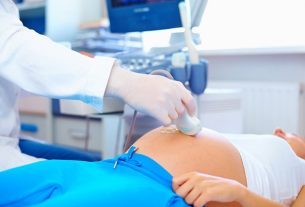Pregnancy after the age of 40 is always considered high risk even if the woman does not have any illness, because in this age group, the probability of miscarriages is much higher and women are more likely to have illnesses that can complicate pregnancy. , such as high blood pressure and diabetes.
After the age of 40, the chances of pregnancy decrease greatly, as ovarian reserve and egg quality decrease, but it is not impossible to occur naturally, especially if the woman does not have factors that interfere with fertility, such as endometriosis or obstruction. of the uterine tubes. Furthermore, it is also possible to become pregnant through artificial insemination. Find out how artificial insemination is done.
Therefore, for a pregnancy after the age of 40, also called late pregnancy or pregnancy at an advanced age, it is recommended to start prenatal consultations in advance, before conception, to assess the possibility of pregnancy and the risks, in addition to that, after the pregnancy is confirmed, some precautions are necessary, such as carrying out prenatal consultations and exams more frequently, for example.

Risks of pregnancy after 40
The risks of getting pregnant after the age of 40 for women are:
- Miscarriage;
- Greater chance of premature birth;
- Blood loss;
- Ectopic pregnancy;
- Premature placental abruption;
- Previous placenta;
- Rupture of the uterus;
- Premature rupture of membranes;
- Hypertension in pregnancy or pre-eclampsia;
- Gestational diabetes;
- HELLP syndrome.
In addition, there is also a greater risk of prolonged labor or the need for induced labor or cesarean section. See how induced labor is done.
The risks of pregnancy after 40 increase if the woman is pregnant with twins or triplets, for example.
Warning signs to go to the doctor
Therefore, the warning signs that should not be ignored are:
- Loss of bright red blood from the vagina;
- Dark discharge, even in small quantities;
- Dark red or discharge-like bleeding;
- Pain in the lower abdomen, as if it were colic.
If any of these signs or symptoms are present, the woman should go to the doctor to be evaluated and to have an ultrasound scan because this way the doctor can check if everything is ok.
Although it is normal to have small discharge and cramps, especially at the beginning of pregnancy, these symptoms should be discussed with your obstetrician.
Risks for the baby
The risks for babies are more related to chromosomal malformations, which lead to the development of genetic diseases, mainly Down syndrome. Babies can be born prematurely or with low birth weight, increasing health risks after birth.
Women over 40, who wish to become pregnant, should seek advice from a doctor and carry out tests to confirm their physical conditions, thus ensuring a healthy pregnancy from start to finish.
Pregnancy care after 40
In order to have a healthy pregnancy after the age of 40 and reduce the risk of complications, prenatal consultations should be started before conception, to assess the state of health, control pre-existing diseases, such as high blood pressure, diabetes or thyroid problems, carry out the tests requested by the obstetrician and start using folic acid, generally 3 months before conception, or other supplements recommended by the doctor.
During pregnancy, you should continue to undergo prenatal consultations and exams as advised by your obstetrician, continue taking folic acid, and do physical activities recommended by your obstetrician, as they allow you to better control your weight, improve sleep quality and strengthen your health. the musculature.
In addition, you must take extra care with your diet, drinking at least 8 glasses of water per day and eating a nutritious and balanced diet, including fresh fruits and vegetables, to ensure the supply of essential nutrients for the baby’s development. and help control weight gain during pregnancy. See what nutrition should be like during pregnancy.
Before and throughout pregnancy, it is also important to avoid taking medication yourself, consuming alcohol, cigarettes or drugs of abuse, as these can harm the baby’s development.
What is prenatal care like at age 40?
Prenatal care is a little different for women who become pregnant under the age of 35 because more regular appointments and more specific exams are required.
Depending on the need, the doctor may order tests such as more frequent ultrasounds, blood tests to identify toxoplasmosis or cytomegalovirus, HIV types 1 and 2, glucose testing. See the main prenatal exams.
More specific tests to find out if the baby has Down syndrome are chorionic villus collection, amniocentesis, cordocentesis, nuchal translucency, ultrasound that measures the length of the baby’s neck and the maternal biochemical profile.
What is childbirth like at age 40?
As long as the woman and baby are healthy, there are no contraindications to natural birth and this is a possibility, especially if the woman has been a mother before and is pregnant with her second, third or fourth child.
But if the woman has had a cesarean section before, the doctor may suggest that a new cesarean section be performed because the scar from the previous cesarean section can harm labor and increases the risk of uterine rupture during labor. Therefore, each case must be discussed personally with the obstetrician who will perform the birth.

Sign up for our newsletter and stay up to date with exclusive news
that can transform your routine!
Warning: Undefined array key "title" in /home/storelat/public_html/wp-content/plugins/link-whisper-premium/templates/frontend/related-posts.php on line 12
Warning: Undefined array key "title_tag" in /home/storelat/public_html/wp-content/plugins/link-whisper-premium/templates/frontend/related-posts.php on line 13




